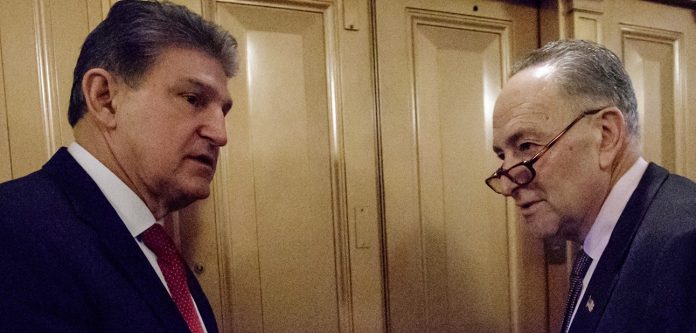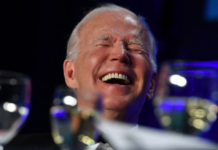A new report recently revealed that Senate Majority Leader Chuck Schumer and Sen. Joe Manchin came to an agreement back in July on the multi-trillion-dollar reconciliation package. The agreement states that the debate on the budget reconciliation will begin no earlier than October 1, 2021, and with a topline of $1.5 trillion. Sen Kyrsten Sinema has also reiterated that she would not vote for the $3.5 trillion packages that the House Democrats have put forward and would stick to a $1.5 trillion price tag.
“As you’ve seen, I think by now, the 1.5 (trillion dollars) was always done from, from my heart, basically [as] what we could do and not jeopardize–not jeopardize our economy,” Manchin told reporters after the released agreement.
Manchin went on to say that he was concerned multiple trillion-dollar infrastructure bills would harm the economy and increase inflation. He pointed out the Dollar General Store in West Virginia, where things are a dollar and a quarter or a dollar and 50 cents. He said things are no longer a dollar and that’s hard for a lot of the people who shop there with all they have.
The document outlines many proposals Manchin has made in the Senate, including raising the corporate tax rate to 25%, the top tax rate on ordinary income to 39.6%, and raising the capital gains tax rate to 28%. Biden’s current proposal would raise the corporate tax rate to 28% and the capital gains tax rate to 39.6%, which Manchin suggests would do irreparable damage to the economy.
Manchin also opposed many new government programs that were added in the bill, saying they would create an “entitlement mentality” among the American people. He said he would rather apply means testing and work requirements to existing programs.
The agreement also states that any revenue exceeding the $1.5 trillion price tag would be used for deficit reduction. Both Manchin and Schumer signed the agreement, with a note below the signatures that states “will try to dissuade Joe on some of these.”
Manchin has emphasized that every member of Congress has a duty to vote for what they believe is best, adding that he does not believe it is in the best interest of the country to support a $3.5 trillion trillion spending bill when they’ve already spent $5.4 trillion since last March.
The GOP has been stating that the bill is far too expensive and ends up punishing the middle-class rather than helping it. The leaked documents between Manchin and Schumer only reiterate a lack of trust in their own party, with Politico reporter Tara Palmeri pointed out that the documents are a “far cry from a time when a handshake was enough.”
The paper was a slap in the face to far-left members of the House who’ve been pushing for extra money towards their radical programs. Sen. Mazi Hirono called the agreement “very sad” and Sen. Chris Murphy said the documents reveal what Manchin’s priority is and how they can motivate him to get closer to a deal. Even Sen. Elizabeth Warren came out to say she was “not happy” about the news and that it’s always helpful when you’re having conversations about what other people are up to.
Sen. Chris Koons also said he was surprised that the documents were not released and that they have made it clear what Manchin’s basic positions and principles are. “It’s positive that this leads us to a clear list from here,” Koons said.
While Schumer never said he would “agree” to Manchin’s conditions, he said he would try to acknowledge where Manchin was at on voting. He said he would work to convince Manchin to support a final reconciliation bill. While Democrats control only 50 seats in the House, they need all 50 onboard to pass the bill. Without Manchin and Sinema’s votes, the bill would not go through.
Manchin has not budgeted into his position, adding that there is a “much better way” to negotiate and approach the fiscal reality of the nation. Schumer has kept many of his members in the dark over the documents while Manchin knew what he wanted and was still ignored by many members. He has stuck to seeming firm on the $1.5 trillion price tag and not a penny more. Moderate democrats continue to stand up against the radical members of their party. Between bloated spending and inaccurate depictions of the economy, someone has to.




